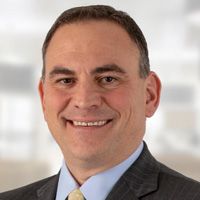How the One Big Beautiful Bill Will Change Charitable Giving
Taxpayers who don't itemize will be able to take a bigger deduction for donations, which could boost giving. However, high-income donors could see their tax benefits reduced.

Profit and prosper with the best of Kiplinger's advice on investing, taxes, retirement, personal finance and much more. Delivered daily. Enter your email in the box and click Sign Me Up.
You are now subscribed
Your newsletter sign-up was successful
Want to add more newsletters?

Delivered daily
Kiplinger Today
Profit and prosper with the best of Kiplinger's advice on investing, taxes, retirement, personal finance and much more delivered daily. Smart money moves start here.

Sent five days a week
Kiplinger A Step Ahead
Get practical help to make better financial decisions in your everyday life, from spending to savings on top deals.

Delivered daily
Kiplinger Closing Bell
Get today's biggest financial and investing headlines delivered to your inbox every day the U.S. stock market is open.

Sent twice a week
Kiplinger Adviser Intel
Financial pros across the country share best practices and fresh tactics to preserve and grow your wealth.

Delivered weekly
Kiplinger Tax Tips
Trim your federal and state tax bills with practical tax-planning and tax-cutting strategies.

Sent twice a week
Kiplinger Retirement Tips
Your twice-a-week guide to planning and enjoying a financially secure and richly rewarding retirement

Sent bimonthly.
Kiplinger Adviser Angle
Insights for advisers, wealth managers and other financial professionals.

Sent twice a week
Kiplinger Investing Weekly
Your twice-a-week roundup of promising stocks, funds, companies and industries you should consider, ones you should avoid, and why.

Sent weekly for six weeks
Kiplinger Invest for Retirement
Your step-by-step six-part series on how to invest for retirement, from devising a successful strategy to exactly which investments to choose.
Defining success in philanthropy depends entirely on the goals an investor is trying to achieve, whether these are social, wealth transfer, personal or tax-deductibility objectives.
With the passage of the One Big Beautiful Bill (OBBB), new tax rules and opportunities are now available to help investors reach their goals.
OBBB's key changes to charitable giving
The OBBB introduced four important changes to tax laws affecting charitable giving:
From just $107.88 $24.99 for Kiplinger Personal Finance
Become a smarter, better informed investor. Subscribe from just $107.88 $24.99, plus get up to 4 Special Issues

Sign up for Kiplinger’s Free Newsletters
Profit and prosper with the best of expert advice on investing, taxes, retirement, personal finance and more - straight to your e-mail.
Profit and prosper with the best of expert advice - straight to your e-mail.
Standard deduction. Taxpayers who take the standard deduction will be able to claim a deduction for charitable contributions of up to $1,000 for single filers and $2,000 for joint filers.
Kiplinger's Adviser Intel, formerly known as Building Wealth, is a curated network of trusted financial professionals who share expert insights on wealth building and preservation. Contributors, including fiduciary financial planners, wealth managers, CEOs and attorneys, provide actionable advice about retirement planning, estate planning, tax strategies and more. Experts are invited to contribute and do not pay to be included, so you can trust their advice is honest and valuable.
Itemized deductions. The individual deduction limit for cash contributions made to public charities is 60% of a taxpayer's adjusted gross income (AGI). This limit was previously scheduled to sunset and revert to 50% at the end of 2025, but the OBBB extends the current 60% limit.
0.5% floor. For individual taxpayers who itemize deductions, the OBBB creates a new floor of 0. 5% to be eligible to deduct charitable contributions. This means that individuals will be able to deduct only the value of charitable gifts that exceed 0.5% of their AGI — that's $500 for every $100,000 in AGI.
Deductibility cap. For itemizers, the tax law also caps the benefit of the total itemized deductions at 35 cents per dollar for taxpayers who are in the 37% tax bracket.
These changes for individual taxpayers are effective for taxable years beginning January 1, 2026.
While introducing a charitable deduction for taxpayers who don't itemize might encourage greater participation in giving, high-income taxpayers could see a reduced tax benefit from charitable deductions in the future.
In light of these changes, some donors might consider accelerating their contributions in 2025 using a donor-advised fund (DAF) to maximize the value of their contributions before the new changes go into effect.
Understanding donor-advised funds
DAFs are charitable accounts funded by individual donors but maintained and operated by a charity. Once a donor makes a contribution, the sponsoring charity is responsible for maintaining the account, investing contributions and distributing funds in line with the donor's advice.
Distributions are made whenever and to whomever the donor and the sponsoring charity direct. Unlike private foundations, which require a 5% distribution each year, the law doesn't require DAF funds to be deployed at any time.
Looking for expert tips to grow and preserve your wealth? Sign up for Adviser Intel (formerly known as Building Wealth), our free, twice-weekly newsletter.
DAFs are treated as public charities for tax-deduction purposes; however, DAFs aren't qualified recipients of a qualified charitable distribution (QCD).
As a result, DAFs can't receive qualified distributions from retirement accounts or from nonitemizers seeking to take advantage of the new $1,000 below-the-line deduction for cash contributions.
Selecting the right DAF can be as important as selecting the eventual charitable recipients, and thanks to innovations in product development, investors have some compelling options.
For example, the recently launched Janus Henderson Charitable Investment Accounts provides a tax-deductible opportunity for investors with no account minimums, low contribution minimums, grants as low as $50, tax-free growth potential and an attractive fee structure.
The time is now
The OBBB has altered some of the rules of philanthropy, and investors should act ahead of the end of the year to secure the tax benefits provided by the new law.
This is especially true for high-income taxpayers who have an opportunity to accelerate contributions in 2025, implement a bunching or bundling strategy via a DAF and make the most of current tax regulations before they change.
To maximize deductibility and avoid application of the 0.5% floor, we believe itemizers should "prefund" charitable contributions into their charitable investment accounts this year.
A charitable gift of $5,000 made in 2025 generates a $5,000 deduction. That same $5,000 charitable gift made in $1,000 increments per year beginning in 2026 would create a total deduction of $2,500.
For a potentially better tax result, investors can "bunch" those charitable gifts into a DAF this year and make gifts to charity from the DAF in the coming five years.
As always when it comes to tax planning, investors should work with a trusted tax professional or financial adviser to create a plan that meets their values and goals.
Matthew Sommer is a Managing Director and Head of Specialist Consulting Group at Janus Henderson Investors. His team consists of various subject matter experts across several disciplines, including retirement planning, wealth advisory, practice management and investment strategies. They provide clients actionable insight and expertise they can implement into their business practice to retain and gain clients. Prior to joining Janus in 2010, Dr. Sommer spent 17 years at Morgan Stanley Wealth Management and its predecessors, Citi Global Wealth Management and Smith Barney, during which time his roles included director of financial planning and director of retirement planning.
Jeffrey R. Brooks is an Executive Director and Wealth Strategist with the Specialist Consulting Group at Janus Henderson Investors. Jeff brings to his role years of experience in both the practice of law as well as the financial services industry, working together with financial advisors and their high-net-worth and ultra-high-net-worth clients. His knowledge and real-world experience are invaluable for advisers and investors facing hurdles in the quest to achieve tax, wealth transfer, family governance, business succession and philanthropic goals.
The information contained herein is for educational purposes only, is not an account type recommendation, and should not be construed as financial, legal or tax advice.
Investing involves risk, including the possible loss of principal and fluctuation of value.
A donor-advised fund is facilitated by a tax-exempt public charity under sections 501(c)(3) and 509(a)(1) of the Internal Revenue Code. Contributions made to a donor-advised fund are considered an irrevocable gift and are not refundable. Once contributed, the charitable organization facilitating the donor-advised fund has exclusive legal control over the contributed assets.
Donors should carefully consider information contained in the prospectus, or if available, the summary prospectus, for the registered underlying mutual funds, including investment objectives, risks, charges and expenses. Donors can request a prospectus by calling Janus Henderson at 800-525-3713. Please read the prospectus carefully before making contributions.
Market fluctuations may cause the value of investment fund shares held in a donor-advised account to be worth more or less than the value of the original contribution to the funds.
Related Content
- Five Ways to Maintain Charitable Giving During Volatile Times: A Giver's Guide
- One Big Beautiful Bill, One Big Question: Will We Keep Giving?
- Five Ways to Adapt Your Charitable Giving Strategy in a Changing World: An Expert Guide
- Three Easy Financial Tips to Help Make This Year a Success
- Three Financial Planning Strategies for When Markets Fall
Profit and prosper with the best of Kiplinger's advice on investing, taxes, retirement, personal finance and much more. Delivered daily. Enter your email in the box and click Sign Me Up.

Matt Sommer is a Managing Director and Head of Specialist Consulting Group at Janus Henderson Investors. His team consists of various subject matter experts across several disciplines, including retirement planning, wealth advisory, practice management and investment strategies. They provide clients actionable insight and expertise they can implement into their business practice to retain and gain clients. Prior to joining Janus in 2010, Dr. Sommer spent 17 years at Morgan Stanley Wealth Management and its predecessors, Citi Global Wealth Management and Smith Barney, during which time his roles included director of financial planning and director of retirement planning.
-
 Quiz: Do You Know How to Avoid the "Medigap Trap?"
Quiz: Do You Know How to Avoid the "Medigap Trap?"Quiz Test your basic knowledge of the "Medigap Trap" in our quick quiz.
-
 5 Top Tax-Efficient Mutual Funds for Smarter Investing
5 Top Tax-Efficient Mutual Funds for Smarter InvestingMutual funds are many things, but "tax-friendly" usually isn't one of them. These are the exceptions.
-
 AI Sparks Existential Crisis for Software Stocks
AI Sparks Existential Crisis for Software StocksThe Kiplinger Letter Fears that SaaS subscription software could be rendered obsolete by artificial intelligence make investors jittery.
-
 5 Top Tax-Efficient Mutual Funds for Smarter Investing
5 Top Tax-Efficient Mutual Funds for Smarter InvestingMutual funds are many things, but "tax-friendly" usually isn't one of them. These are the exceptions.
-
 Why Invest In Mutual Funds When ETFs Exist?
Why Invest In Mutual Funds When ETFs Exist?Exchange-traded funds are cheaper, more tax-efficient and more flexible. But don't put mutual funds out to pasture quite yet.
-
 Social Security Break-Even Math Is Helpful, But Don't Let It Dictate When You'll File
Social Security Break-Even Math Is Helpful, But Don't Let It Dictate When You'll FileYour Social Security break-even age tells you how long you'd need to live for delaying to pay off, but shouldn't be the sole basis for deciding when to claim.
-
 I'm an Opportunity Zone Pro: This Is How to Deliver Roth-Like Tax-Free Growth (Without Contribution Limits)
I'm an Opportunity Zone Pro: This Is How to Deliver Roth-Like Tax-Free Growth (Without Contribution Limits)Investors who combine Roth IRAs, the gold standard of tax-free savings, with qualified opportunity funds could enjoy decades of tax-free growth.
-
 One of the Most Powerful Wealth-Building Moves a Woman Can Make: A Midcareer Pivot
One of the Most Powerful Wealth-Building Moves a Woman Can Make: A Midcareer PivotIf it feels like you can't sustain what you're doing for the next 20 years, it's time for an honest look at what's draining you and what energizes you.
-
 Stocks Make More Big Up and Down Moves: Stock Market Today
Stocks Make More Big Up and Down Moves: Stock Market TodayThe impact of revolutionary technology has replaced world-changing trade policy as the major variable for markets, with mixed results for sectors and stocks.
-
 I'm a Wealth Adviser Obsessed With Mahjong: Here Are 8 Ways It Can Teach Us How to Manage Our Money
I'm a Wealth Adviser Obsessed With Mahjong: Here Are 8 Ways It Can Teach Us How to Manage Our MoneyThis increasingly popular Chinese game can teach us not only how to help manage our money but also how important it is to connect with other people.
-
 Looking for a Financial Book That Won't Put Your Young Adult to Sleep? This One Makes 'Cents'
Looking for a Financial Book That Won't Put Your Young Adult to Sleep? This One Makes 'Cents'"Wealth Your Way" by Cosmo DeStefano offers a highly accessible guide for young adults and their parents on building wealth through simple, consistent habits.

